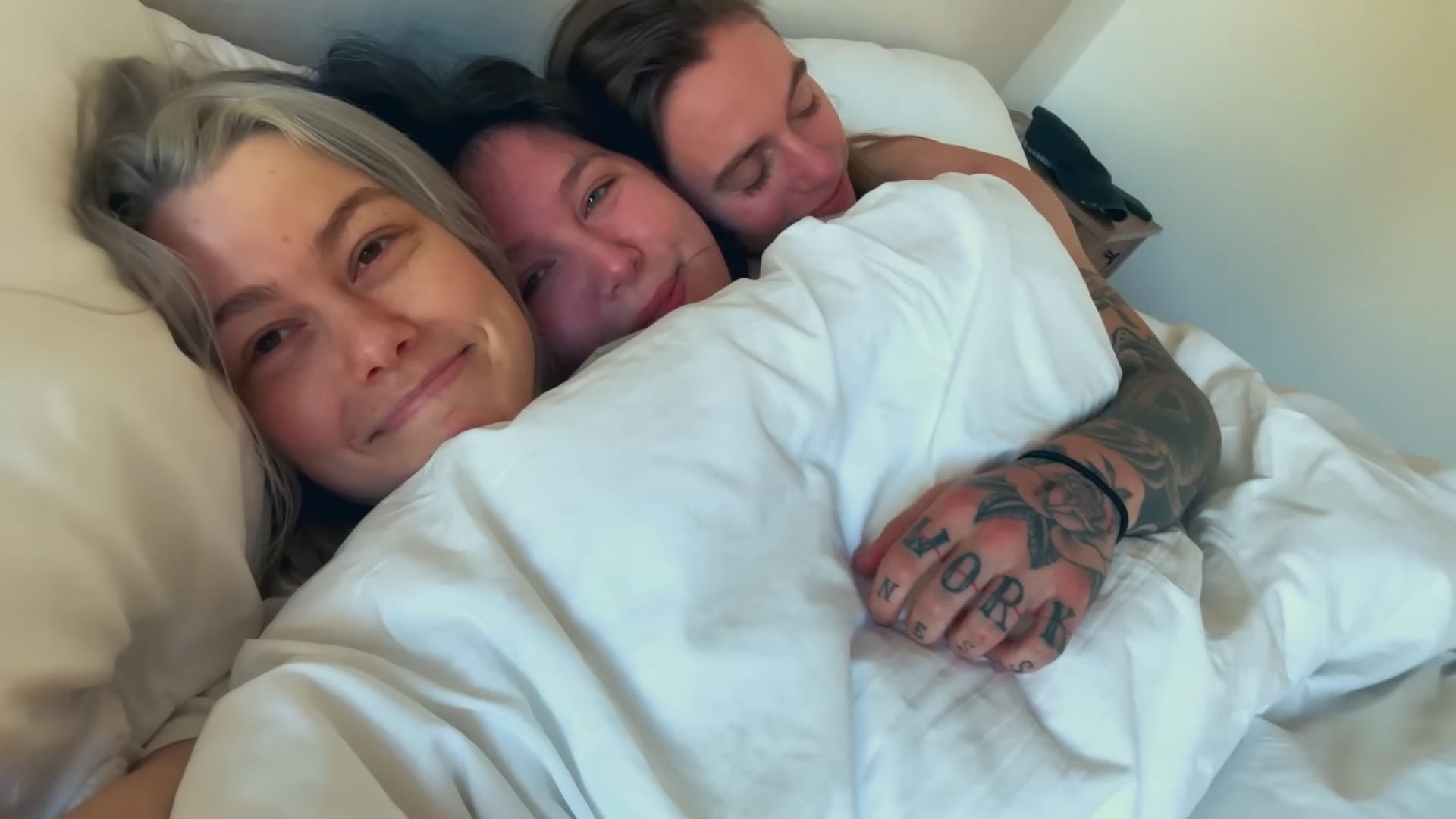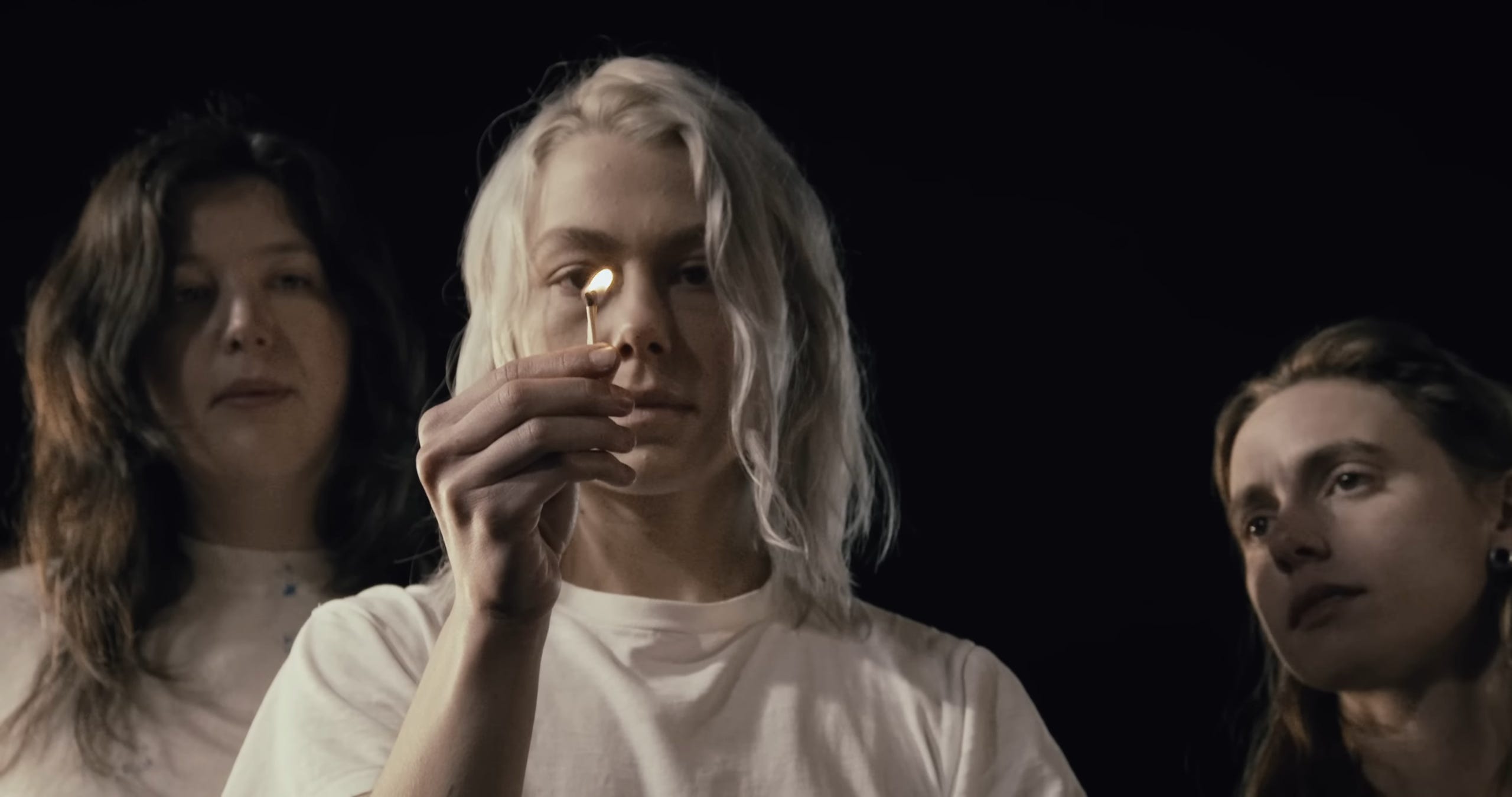Paging Dr. Lesbian - The Ecstatic Joy of Queer Friendship
This is the Sunday Edition of Paging Dr. Lesbian. If you like this type of thing, subscribe, and share it with your friends. Upgrade your subscription for more, including weekly dispatches from the lesbian internet. To that end, I’ve just created a special sale, which is a 60-day free trial that includes both the Sunday Edition and weekly dispatches (along with my monthly playlists). Redeem the special offer here!
Within art and pop culture, romantic love is often considered the most significant, life-affirming kind of love. But where does that leave friendship? With Boygenius’ debut album, the record, they have accomplished an uncommon feat. The band – which is composed of Julien Baker, Phoebe Bridgers, and Lucy Dacus – is an artistic pursuit where friendship is the central organizing force. Sure, one could argue that friendship is one of the most essential elements in the creation of any successful band. But with Boygenius, friendship is not only what brought them together, but also the sustaining life-force of their music. Friendship is a sadly under-theorized topic within literature and academia. Jacques Derrida, a scholar best known for his compulsion to take things apart, took the topic under serious consideration in his 1994 book The Politics of Friendship. Hua Hsu, who writes beautifully about friendship in his memoir, Stay True, notes that Derrida sees great power and promise in friendship, noting that The Politics of Friendship “is ultimately a book about social bonds, and our capacity to envision a collective future that surpasses the dire possibilities of the present.” Friendship can illuminate new ways of thinking, and orient our aim toward the future. Apart, Baker, Bridgers and Dacus are three of the most incisive voices in indie music. Together, they are an unstoppable force. Derrida is attentive to the inherent precarity of friendship, as are Boygenius. “From the moment we befriend someone, he argues, we are already preparing for the possibility that we might outlive them, or they us,” writes Hsu. The possibility of death is ever-present in Boygenius’ music. “I don’t wanna die / That’s a lie,” Bridgers sings in “Revolution 0.” As Hsu explains, “Derrida insists that the narrative of friendship requires us to constantly imagine how we may someday pay our friends eulogistic tribute.” Or, to put it even more simply, “No friend without the possibility of a wound.” Boygenius also possess this future-looking, if somewhat morbid, outlook. In “We’re In Love,” which serves as Dacus’ love letter to the band, she imagines their deaths and eventual reincarnations. Well-attuned to the innate dangers of true love, Dacus begins the song by singing “You could absolutely break my heart / And that’s how I know that we’re in love.” Dacus goes on to imagine a future where the boys of Boygenius are no longer in her life, but she also proposes that they meet in the next life, positive that they will always recognize one another. Boygenius’ music beautifully illustrates the tension between the past, present, and future, a tension that anchors friendship to its precarious materiality. This tension also has queer undertones, and the fact that all three members of the band are queer women is not insignificant. In her book Feeling Backward: Loss and the Politics of Queer History, Heather Love writes that “Queer history is, in a sense, nothing but wounded attachments.” Michel Foucault, a scholar known primarily for his sweeping analyses of social systems, once proposed that the “best moment” in the life of a homosexual is “when the lover leaves in the taxi.” Following this logic, the most pleasurable part of queerness is looking backward rather than imagining a future that may not exist. It’s Orpheus’ perplexing decision to turn back and chance one more look at Eurydice On their solo songs – which aren’t really solo songs, but rather written and sung in communion with one another – the boys dredge up memories of their past selves. But these reminiscences never feel masochistic, especially when they are bolstered by the sweet harmonies of the other bandmates. Ultimately, what is so invigorating about Boygenius is their vigorous commitment to excavating personal histories – some of which bring up feelings of grief or despair – coupled with a progressive, forward-looking commitment to the pleasures of friendship. While Dacus imagines their eventual reincarnation and reconciliation in “We’re In Love,” the video for Baker’s “$20” – part of a series of videos called the film, directed by Kristen Stewart – instead imagines a revisionist history. Baker plays a younger version of herself, while youthful actors play younger versions of Bridgers and Dacus, dreaming up a fantasy where they all grew up together. This combination of retrospective and futuristic thinking is precisely what Derrida means when he describes the weight of friendship. “I live in the present speaking of myself in the mouths of my friends,” he writes. “I already hear them speaking on the edge of my tomb… Already, yet when I will no longer be. As though pretending to say to me, in my very own voice: rise again.” Derrida suggests that friendship demands the creation of pre-emptive eulogies; Boygenius enshrines this fact. While Derrida writes of both the power and precarity of friendship, other thinkers have emphasized the way it acts as a sort of safe harbor, protecting its inhabitants from the perils and pitfalls of romantic love. For example, French Renaissance philosopher Michel de Montaigne once wrote, “In friendship, it is a general and universal warmth…with nothing bitter and stinging about it.” If it wasn’t already clear, the boys take a more profound approach to the subject. As Dacus so eloquently puts it in “We’re In Love,” friendship can be just as powerful – and dangerous – as romantic love. And who’s to say friendship isn’t romantic? “It was not like falling in love,” Bridgers says of their burgeoning relationship. “It was falling in love.” If all of this wasn’t convincing enough, the three women also make out with one another at the end of the film, perhaps signaling the notion of three parts becoming a whole, or the dissolution of any boundaries between them. It’s so clear that Boygenius’ decision to be vulnerable with one another is at the heart of the band. I would be remiss if I didn’t mention the queer aspects of their association as well. Their intimacy seems to reflect a particularly queer understanding of friendship, one that doesn’t abide by the typical divisions between romantic and platonic. Indeed, the boys seem to be keenly attuned to the power of vulnerability, existing on an emotional register that is often associated with queer women. But there’s also the fact that they have all clearly gone to therapy, are twentysomethings, and have thus emerged into adulthood alongside an increasing awareness about mental health issues, in addition to young people’s cheeky humor about such topics. (Think, for example, of people joking about having mental health breakdowns by calling them “menty bs.”) This insistence on vulnerability coupled with a penchant for irreverence – Dacus has some particularly amusing lines on the record, and Bridgers is known for her deadpan delivery of darkly ironic observations – produces a series of incredibly rich texts, ripe for both analysis and sing-alongs. Ultimately, the proof of their friendship’s ecstatic power is in the music itself. Dacus' insistence in “True Blue” – a song that is ostensibly about another friend of hers, not Baker or Bridgers – that “It feels good to be known so well” is a succinct illustration of what makes the band function as it does. The boys are all given a chance to shine, as each of their unique perspectives and gifts are allowed space to develop. The best example of this is in the song “Satanist,” where each member gets their own verse. “Would you be a satanist/anarchist/nihilist with me?” sing Baker/Bridgers/Dacus, respectively. It sounds like the beginning of a corny joke – so a satanist, an anarchist, and a nihilist walk into a bar… The most affecting moments are when they all come together in support of one another. The last minute of “Revolution 0,” a song mostly sung by Bridgers, is a series of melodic “ahs,” first articulated by Bridgers, then by Dacus, then by Baker, and then by all three of them, producing a rhapsodic refrain that closes out Bridgers’ earlier dolefulness. And then there’s the coming together at the end of the film, when Baker and Bridgers, who performed their songs in their own contained universes, hop on over to Dacus’ world to help her paint a house blue (followed by the mandatory making-out, of course). It’s these junctures that so evocatively clarify how vulnerability, solidarity, and understanding can have such profound effects. In this day and age – and also since the beginning of recorded history – music often functions as a collective experience. For Boygenius, what that means is that the contours of their own friendship can invite others into the Boygenius canon. The record has several callbacks to songs on their EP, connections that dedicated fans likely recognize. The most electrifying of these comes in the final track of the album “Letter To An Old Poet,” where Bridgers and co. scream/sing “I wanna be happy” with the same melody as “I wanna be emaciated” from “Me & My Dog.” I went to a listening session at a record store several days before the album was officially released, and an audible gasp rippled through the crowd when that line played over the speakers. Many of the patrons at the record store that day seemed to be groups of queer friends, much like the members of Boygenius. Those there alone – like myself – listened in quiet contemplation, typing their favorite lyrics into their phones. This, of course, is the enduring potential of their music – the sense of recognition it embodies and produces in listeners. As Derrida puts it, out of all of friendship’s many pleasures, “none is comparable to this unequaled hope, to this ecstasy towards a future which will go beyond death.” Or as Dacus puts it, “I could go on and on and on – and I will.” Get your free trial here. You’re a free subscriber to Paging Dr. Lesbian. For the full experience, which includes weekly dispatches from the lesbian internet, become a paying subscriber. Your support means a lot! |
Older messages
10 Movies To Watch If You Love Carol
Sunday, April 2, 2023
On falling in love, out of time
'The Fifth Wound' Will Swallow You Whole
Sunday, March 26, 2023
On Aurora Mattia's startling debut
Discovering "Lianna"
Sunday, March 19, 2023
A hidden gem of independent '80s cinema
Ready Or Not, Here Comes Mama
Sunday, March 12, 2023
To Wong Foo is an unlikely '90s classic, but how does it resonate today?
The Queer Danger of Girl, Interrupted
Sunday, March 5, 2023
Or, The Conclusion of Angelina Jolie's Queer '90s Trilogy
You Might Also Like
6 Most Common Tax Myths, Debunked
Saturday, March 8, 2025
How to Finally Stick With a Fitness Habit. Avoid costly mistakes in the days and weeks leading up to April 15. Not displaying correctly? View this newsletter online. TODAY'S FEATURED STORY Six of
Weekend: My Partner Can’t Stand My Good Friend 😳
Saturday, March 8, 2025
— Check out what we Skimm'd for you today March 8, 2025 Subscribe Read in browser Header Image But first: this is your sign to throw away your old bras Update location or View forecast EDITOR'S
Your Body NEEDS to Cardio Row! Here Are Some Options.
Saturday, March 8, 2025
If you have trouble reading this message, view it in a browser. Men's Health The Check Out Welcome to The Check Out, our newsletter that gives you a deeper look at some of our editors' favorite
What Do You Really Need?
Saturday, March 8, 2025
Is opposing consumerism lacking gratitude? ͏ ͏ ͏ ͏ ͏ ͏ ͏ ͏ ͏ ͏ ͏ ͏ ͏ ͏ ͏ ͏ ͏ ͏ ͏ ͏ ͏ ͏ ͏ ͏ ͏ ͏ ͏ ͏ ͏ ͏ ͏ ͏ ͏ ͏ ͏ ͏ ͏ ͏ ͏ ͏ ͏ ͏ ͏ ͏ ͏ ͏ ͏ ͏ ͏ ͏ ͏ ͏ ͏ ͏ ͏ ͏ ͏ ͏ ͏ ͏ ͏ ͏ ͏ ͏ ͏ ͏ ͏ ͏ ͏ ͏ ͏ ͏ ͏ ͏ ͏ ͏ ͏ ͏ ͏
“Otway” by Phoebe Cary
Saturday, March 8, 2025
Poet, whose lays our memory still / Back from the past is bringing, ͏ ͏ ͏ ͏ ͏ ͏ ͏ ͏ ͏ ͏ ͏ ͏ ͏ ͏ ͏ ͏ ͏ ͏ ͏ ͏ ͏ ͏ ͏ ͏ ͏ ͏ ͏ ͏ ͏ ͏ ͏ ͏ ͏ ͏
Cameron Diaz Returned To Fashion Week In A Fabulous Little Red Dress
Saturday, March 8, 2025
WOW. The Zoe Report Daily The Zoe Report 3.7.2025 Cameron Diaz's Asymmetrical Red Dress Lit Up The Stella McCartney Fall 2025 Show (Celebrity) Cameron Diaz Returned To Fashion Week In A Fabulous
5-Bullet Friday — Breaking the Sperm Bank, D-Cycloserine, Tools for Grumpy Elbows, and Wisdom from Seth Godin
Saturday, March 8, 2025
“If you're feeling creative, do the errands tomorrow. If you're fit and healthy, take a day to go surfing. When inspiration strikes, write it down." ͏ ͏ ͏ ͏ ͏ ͏ ͏ ͏ ͏ ͏ ͏ ͏ ͏ ͏ ͏ ͏ ͏ ͏ ͏ ͏
Inside Alex Pereira's Training for Saturday's UFC 313 Showdown
Friday, March 7, 2025
View in Browser Men's Health SHOP MVP EXCLUSIVES SUBSCRIBE Inside Alex Pereira's Training for Saturday's UFC 313 Showdown Inside Alex Pereira's Training for Saturday's UFC 313
Update Your Android Devices Now 🚨
Friday, March 7, 2025
This TikTok Cleaning Method Might Have Broken My Fan. The security update includes fixes for two zero-day exploits. Not displaying correctly? View this newsletter online. TODAY'S FEATURED STORY
EmRata's Itty-Bitty Bikini Just Brought Back This "Cheugy" 2010s Trend
Friday, March 7, 2025
Plus, everything you need to know about Venus retrograde, your daily horoscope, and more. Mar. 7, 2025 Bustle Daily New books from Emily Henry, Karen Russell, and Kate Folk are among Bustle's best



